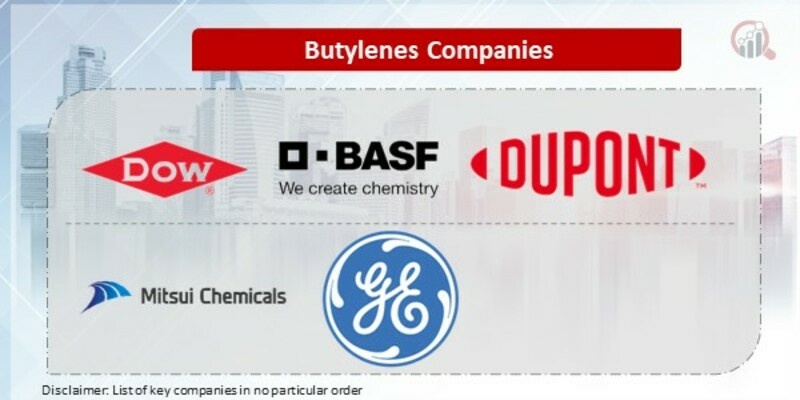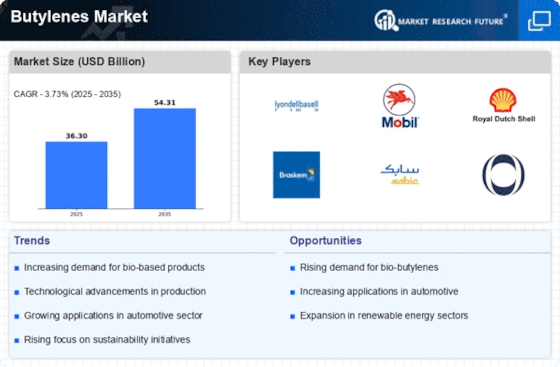Top Industry Leaders in the Butylenes Market

The butylenes market, a crucial segment within the petrochemical industry, is poised for steady growth is driven by the rising demand for its derivatives in various sectors like plastics, synthetic rubber, and fuels. However, navigating this seemingly calm stream requires understanding the dynamic competitive landscape, the factors shaping market share, and the recent developments that stir the waters.
Competitive Strategies Shaping the Market:
-
Integrated Giants: ExxonMobil, Dow Chemical, Shell, and Sinopec leverage their extensive production capacities, diverse product portfolios, and global reach to maintain dominance. Their strategies focus on expanding cracker capacities, optimizing production processes, and strategic acquisitions to secure feedstock availability. -
Regional Players: Companies like Reliance Industries in India and Formosa Plastics in Taiwan hold strong positions in their respective regions. They compete on cost, cater to regional demand dynamics, and build strategic partnerships with downstream manufacturers. -
Specialty Players: Smaller companies like LyondellBasell and Braskem carve niches with specialty butylene grades or focus on specific geographic markets. They capitalize on agility, operational efficiency, and targeted customer relationships.
Factors Dictating Market Share:
-
Feedstock Availability and Pricing: Access to affordable and stable naphtha or natural gas feedstock is crucial for cost competitiveness. Players with integrated cracker operations or strategic feedstock sourcing agreements have an advantage. -
Production Capacity and Efficiency: Large-scale production facilities and optimized processes enable economies of scale and cost leadership, attracting a wider customer base. -
Product Portfolio and Diversification: Offering a diverse range of butylene grades tailored to specific end-use applications like linear alpha olefins (LAOs) or butadiene rubber expands market reach and increases market share. -
Geographical Presence and Distribution Network: A strong global presence with efficient logistics and distribution networks ensures timely delivery and market reach, particularly in geographically diverse markets. -
Sustainability and Regulatory Compliance: Adhering to environmental regulations and developing eco-friendly butylene production processes is becoming increasingly important to gain market access and secure customer loyalty.
Key Players:
-
Dow Chemical
-
BASF
-
DuPont
-
Mitsui Chemicals
-
GE
Recent Developments :
March 2022: In March 2022, Honeywell introduced cutting-edge technological innovations aimed at enhancing ethylene production from naphtha cracking processes.
April 2022: In April 2022, Lummus Technology and Braskem entered into a licensing partnership for green ethylene technology. This partnership enables the production of chemicals and plastics using bioethanol, aligning with the industry's dedication to achieving a carbon-neutral circular economy.
On November 8th, 2021, Exxon Mobil Corporation announced that it would set up a chemical manufacturing complex in Dayawan Petrochemical Industrial Park, Huizhou Guangdong Province, China, as part of expanding its presence there.










